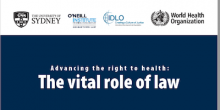For press information, including access to broadcast-quality video, b-roll footage, photography and other multimedia assets, please contact press@idlo.int.
News E-Library
While the new Constitution of Kenya, 2010 provides for the right of every Kenyan to access justice, its implementation is vital to strengthen and support the changes required for a better Kenya. IDLO is supporting the Kenyan Government to implement...
Languages: English - Pусский
As part of IDLO’s work in Kyrgyzstan to both raise public awareness of the judicial decision-making process and to prepare students for careers in this field, the USAID-IDLO Kyrgyzstan Judicial Strengthening...
As part of IDLO’s continuous commitment to accountability and results-based management, IDLO is pleased to share this Evaluation Brief for the project, "Enhancing the Capacity of the Legal Professional in Somalia for the Delivery of...
One of the challenges in scaling up HIV-related legal services is the limited number of knowledgeable, skilled and committed lawyers to provide such services. Part of the solution therefore lies in building the capacity of law schools to ensure law...
As in many transition countries, non-enforcement of court decisions in Ukraine remains a key problem which affects not only investor confidence but also the functioning of the whole judiciary. Among particular concerns are lengthy delays, lack of...
Despite significant donor assistance and a marked improvement over the past decade, Afghanistan's justice institutions still suffer from a severe lack of capacity across a range of basic competencies. These deficiencies persist due to a variety of...
The criminal justice system in the Philippines experiences poor coordination among agencies, particularly police and prosecutors. Currently, there is a shortage of prosecutors to take criminal cases to trial in the Department of Justice (DOJ), and...
In 2014 a new international treaty entered into force – the Nagoya Protocol under the Convention on Biological Diversity (CBD). The Protocol sets up a new global regime that aims to promote research and innovation using genetic resources and...
Kenya finds itself at an opportune moment to advance gender equality. The country’s new constitution, adopted in 2010, expanded the Bill of Rights including for the first time provisions on economic, social and cultural rights. One of the most...
Tajikistan’s enforcement framework and practice is considered to be the poorest in the region according to an assessment by the European Bank for Reconstruction and Development (EBRD). Non-enforcement and lengthy delays of court decisions,...
Opening IDLO’s Partnership Forum in December, President of IDLO’s Assembly of Parties, Nawaf Al-Mahamel, acknowledged that the event came at an important time for the organization with the Assembly of Parties having just approved its Strategic Plan...
STATEMENT OF THE INTERNATIONAL DEVELOPMENT LAW ORGANIZATION
HIGH LEVEL DIALOGUE
BUILDING SUSTAINABLE PEACE FOR ALL: SYNERGIES BETWEEN THE 2030 AGENDA FOR SUSTAINABLE DEVELOPMENT AND SUSTAINING PEACE
Workshop III: Strengthening...
This report aims to raise awareness about the role that the reform of public health laws can play...
Soda tax in Mexico. Salt limits in South Africa. Plain tobacco packaging in Australia. National health insurance in Ghana. Mandatory motorcycle helmets in Vietnam.
They’re just some of the hundreds of examples of the vital role the law plays in...
Event Date
16 January, 2017
“How do we know when the rule of law works? What do we mean by justice?” opened IDLO’s Director of Research and Learning, Ilaria Bottigliero, at the expert roundtable, Critical Reflections on the 2nd Generation of Rule of Law Reform. “For IDLO, it’s...












